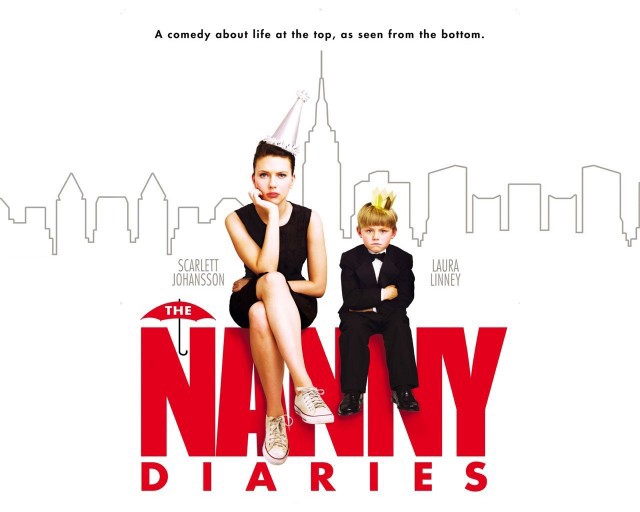A Nanny (BA, MSW) Chats about Psych Grad Programs, Zigzagging Through Life

Ester: Hello! Would you like to begin by introducing yourself in a general way?
Brittany: I moved to Brooklyn in December 2012. I am currently working as a nanny in Park Slope.
Ester: How did you end up living here and doing that? Tell us about your JOURNEY.
Brittany: Well, my boyfriend and I are both originally from the Northeast, but we’d been living in the Midwest for about 4 years. We wanted to move closer to home, and a job opportunity opened up for him. I had applied for the PhD program in Psychology at NYU, but was accepted into the master’s program — to the tune of about $60K a year including cost of living. I decided to defer for a year and found work as a nanny.
Ester: Did you not get into the PhD program? Or is a Master’s simply the first step?
Brittany: I was not accepted into the PhD program, but they automatically sent my application to the master’s program committee. Typically, you earn a master’s en route to a PhD, but the difference is funding. With most PhD Psychology programs, students are fully funded and receive a stipend or assistantship. Master’s programs in psychology — just general psych, not necessarily counseling psychology or forensic psychology — tend to be cash cows for universities. PLUS I already have a master’s degree in social work and around $100K in student debt. I didn’t need to add another $120K to that!
Ester: Yikes! I see. Is the idea that, after completing a Master’s in psych, you would have a leg up in terms of then getting into the PhD program? Would you be guaranteed admission?
Brittany: I probably would have had a leg up because I had enrolled in PhD level classes (I decided to defer about 3 weeks before the program was scheduled to start), but I wouldn’t have been guaranteed admission. I was told by the director of the master’s program that I probably would have gotten into PhD programs in lower-tiered schools, however that is determined.
Ester: Have you practiced as a social worker, since you have your Master’s in that? What made you decide, even temporarily, to be a nanny instead?
Brittany: Truthfully, I realized during graduate school that I didn’t want to practice social work, but since I was already around half-way through the program, I felt like I needed to finish it. You know, have that degree under my belt. After graduating from the program in 2011, I moved to St. Louis and was a memory lab manager at Washington University in St. Louis. When I moved to NYC, I tried to find research jobs, but I was suddenly a regular-sized fish in a much, much larger pond. I submitted dozens of applications, some for research, some for social work, some for both, but I never received any calls. I needed to pay rent and bills and loans, and I love kids, so nannying was a logical choice. And it was so much easier to just get callbacks.

The girls of the Babysitters Club always get callbacks
Ester: Yeah, New York is one tough lady to try to please, and she is renowned for never returning a phone call. Why did social work not appeal? And why would be a PhD be different? I ask because I know a number of people turning to psychology now as a sort of “second” career (actually often third or fourth) and I’m curious about all the different paths. One person I know is getting a Master’s in Counseling; another pursued a PsyD. There seem to be lots of subtle gradations that can be hard to understand from the outside.
Brittany: There sure are! I like science. I love science! And for some reason, I thought social work would be rooted in the study of the dynamics between society and psychology and behavior. It’s possible that it was just my program and that other SW programs are more scientific, but I felt like everything I learned or did was rooted in anecdotes or, “just do what feels right.” I prefer a more formulaic approach. PLUS, at some point I realized that I don’t like doing therapy (perhaps because of the perceived lack of science) or dealing with the various broken systems from the SW perspective.
The differences between all of these various programs typically come down to cost and time. Master’s programs are short, typically two years; doctoral programs are usually 5–6 years. The difference between a PhD and PsyD usually comes down to cost. PhD programs almost always provide funding and stipends, whereas the student (or her/his parents, or the government) has to foot the bill for PsyD programs, so PsyD programs end up being less competitive. Another difference is that unless you’re doing a Clinical Psych PhD, your focus will probably be on research.
Ester: Got it. Can you practice with any of these degrees? By which I mean, hang out a shingle and treat patients? In your case, I get that you’re not as interested in seeing patients, but theoretically?

Brittany: Sure! But a SW or counselor would call them clients rather than patients. A psychiatrist and possibly Clinical PhD might be more inclined to say patients. In order to see patients thought, you have to take a bunch of tests, get licensed or certified, have a bunch of supervised hours, and then take another test and get a more important certification. For SW, I would have had to take an exam to be an LSW (licensed social worker), earned about 3000 supervised hours with clients, and then take another exam to earn an LCSW (licensed clinical social worker) so that I could practice independently. And then if I wanted to move to another state I’d have to jump through a few more hoops.
Ester: That sounds like a lot of work. I guess that’s good, because we want our professionals to be well-trained?
Brittany: Well when I applied for the PhD I had already decided that I didn’t want to do therapy; I was going for the research track. Developmental psychology was where I wanted to be. Specifically I wanted to study early language and conceptual development and something called Bayesian inference. As far as the well-trained piece, yes it is important for professionals to be well-trained, of course. But it was such a commitment to something that I wasn’t sure about.
Ester: Absolutely. That makes sense. Maybe they place the bar that high on purpose, to make sure that only people who are confident they want to practice make it? Regardless, in your case, it seems like nannying / working with kids could be good preparation for studying early language and conceptual development. Has it worked out that way?
Brittany: Ha, I must sound like such a flake, but nannying has actually turned me on to teaching. Should I flake again, nannying might sound like great prep, but most admissions folks won’t see it that way, which is pretty unfortunate.
Ester: No, that’s great! We have this cultural misconception that we are good at ONE THING and we should find our ONE THING and then do it for the rest of our lives. Sort of like how we’re told there is ONE PERSON out there for us. I think it’s more likely that most of us have several things we could do, and sometimes it takes a while to figure out which of those things fits best with our particular constraints. It’s natural to learn as we go. Besides, if you frame it right, it sounds like you’d have a killer application essay for a teaching program — assuming you do decide to go that route.
Brittany: It should! Though I will say that my journey may have been much more streamlined had I learned to listen to myself earlier in life. Or had I at least listened to others less.
Ester: Did you feel pressure to get the Master’s, or pressure not to drop out, or …? What was your gut telling you that you didn’t heed?
Brittany: It’s complicated and my realizations were very piecemeal. Let’s see if I can break it down! I have ALWAYS felt pressure, but it was implied. I think it was more that I was socialized to be a super achieving person who does great things and makes lots of money. I was one of the “smart” ones in my class, so I thought I had to be a doctor. I never really considered anything else until I went to college. And then I realized I didn’t want to be a doctor, but maybe a teacher (there’s my gut!). But my parents said something along the lines of, “We’re not paying for you to go to Cornell to be a teacher.”

So I hopped on the psychology/human development bandwagon. I LOVED it. After I graduated, I took a job as a research assistant in an autism lab at Yale, and then things started to get more confusing. I liked the work and the research a lot, but I struggled with the culture of academia. Lots of big egos. You sort of have to fit into a certain mold.
Ester: Oh, parents! They mean well, mostly, and yet can wreak such havoc. Have they backed off now, in your advancing years?
Brittany: I think at this point they want me to be happy, but I imagine there is some kind of disappointment that I’m not, you know, settled and I’m almost 30. I’ve really just had to take a step back and determine what’s important to me. What I want out of life, not what other people think I should want out of life. I feel like this is a more common thing among women.
Ester: That is the most important lesson of all, one that it can take way more than a decade to learn. And not just women! My fella is currently going through the same process, leaving a law job and not sure what he’ll do next but wanting to do something he wants to do instead what he feels like, and has always felt like, he should do. It’s hard! But life would be less exciting if we didn’t zigzag our way through our extended youths, right? People used to live in straighter lines, but they also died earlier and never got to taste avocado or coconut milk ice cream.
Brittany: I suppose. But it would be nice to be more financially stable now. I feel like zigzagging has become a luxury.
Ester: It’s complicated, I know, especially when you have debt. But everyone has debt — it’s a fact of life these days, and no one has all their shit together. I mean, yes, it would be great to have the answers. I feel that way too. I can’t wait til I can look back at my life and say, “Things seemed so difficult at various times, but now it all makes sense! Everything had to happen that way to bring me to this glorious point!” Whereas in the middle of the muddle it just feels like, “Ugghhhh.”
Brittany: Well, yeah. At the moment I feel like I’ve fucked everything up. I was on a good trajectory. Now I’m a nanny. And I know I shouldn’t pooh-pooh it. Nannying is one of the most challenging jobs I’ve had, but it’s also the most fun and the most rewarding. I doubt if anyone on Wall Street could handle it. Well, I’m sure SOME of them can. (You know, gender roles and society …)
Ester: No, I understand. It’s a historically undervalued job because it’s women’s work and all that. There’s not a lot of prestige in it, especially if you’ve been to both college and graduate school — it’s easy to crave more traditional recognition. But if you’re happy, and it’s leading you to important realizations about yourself, then you’re winning, really, whether you feel like you’re winning or not.
Brittany: I see where you’re coming from, but like you said, when you’re right in the middle of the muddle it feels shitty. And I really miss having grown-up conversations. Lily doesn’t want to talk about how Eric Cantor was just booted in his primary.
Ester: Hey girl, I feel you. I don’t have coworkers either so I have to turn to Twitter.
“Brat Upsets Cantor” is the name of my bar mitzvah memoir.
— Dave Gilson (@daudig) June 11, 2014
Anyway, lots of luck, okay? I know it’s hard but it seems like you’re moving in the right direction, and lots of other people are course correcting, even with debt, just like you are.
Brittany: Well, thanks!
Support The Billfold
The Billfold continues to exist thanks to support from our readers. Help us continue to do our work by making a monthly pledge on Patreon or a one-time-only contribution through PayPal.
Comments